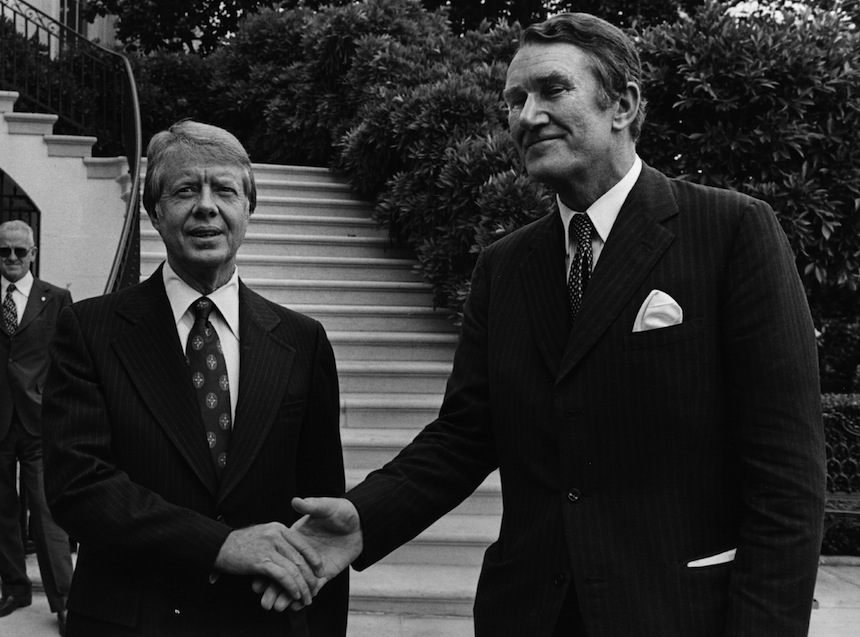Former US President Jimmy Carter dies at 100

Jimmy Carter, the earnest peanut farmer who as US president struggled with a bad economy and the Iran hostage crisis but brokered peace between Israel and Egypt, has died at his home in Plains, Georgia, the Carter Centre said. He was 100.
“My father was a hero, not only to me but to everyone who believes in peace, human rights, and unselfish love,” said Chip Carter, the former president’s son. “My brothers, sister, and I shared him with the rest of the world through these common beliefs”.
Carter was, during his time in office, a vastly unpopular US President who was defeated by Ronald Reagan in an electoral landslide in 1980.
Although the American people booted Carter from the presidency, his public image has undergone a significant, and for him, positive evolution in the years since leaving office.
His one-term presidency was marked by the events that overwhelmed it – inflation, an energy crisis, war in Afghanistan and hostages in Iran.
Despite his unpopularity, Carter committed to human rights, energy conservation and environmental protection during his presidency. He also promoted peace around the world.
Carter played a central role in brokering the Camp David accords that led to the landmark Egypt-Israeli peace treaty.
You might like
The accords contained two main agreements: One was a framework for peace in the Middle East, which included an attempt at resolving the Israeli-Palestinian conflict, and the other was a peace treaty between Israel and Egypt.
In 1977, he also pushed through the Panama Canal treaty, despite fierce conservative opposition. The deal gave Panama control of the canal beginning in 2000.
Leaving office
After leaving the White House, he continued to work on humanitarian and peace-building initiatives, founding the Carter Centre, a non-profit organisation dedicated to promoting human rights and resolving conflicts.
In 2002, he received the Nobel Peace Prize in recognition of his efforts to find peaceful solutions to international conflicts, to advance democracy and human rights, and to promote economic and social development.
Carter also received the Presidential Medal of Freedom.
He worked tirelessly to combat disease and poverty and could often be seen, hammer in hand, helping to build affordable houses as a volunteer for Habitat for Humanity.
In 2021, documentarian Will Pattiz released a film on Carter and his extensive work on conservation and climate change.
“Here’s what people get wrong about Carter,” Pattiz told The Guardian ahead of Carterland’s release.
“He was not in over his head or ineffective, weak or indecisive – he was a visionary leader, decades ahead of his time trying to pull the country toward renewable energy, climate solutions, social justice for women and minorities, equitable treatment for all nations of the world.
Stay informed, daily
“He faced nearly impossible economic problems – and at the end of the day came so very close to changing the trajectory of this nation.”

Outspoken
In recent years, Carter’s public image has also been shaped by his outspoken criticism of various political and social issues.
He has been a vocal advocate for addressing climate change, calling for increased government action to combat the effects of global warming.
Carter is credited as the first international leader to recognise climate change as a problem.
In 1977, he started the Global 2000 Report to investigate how to protect the Earth and achieve “sustainable development” for the next 20 years.
The White House Council on Environmental Quality produced three reports about global warming. The last one, published just before Carter left office, talked about the long-term threat of “carbon dioxide pollution”.
Recently, Carter was an outspoken critic of the Trump administration.
In a 2019 public address, Carter said there was “no doubt” that Russians had interfered with the 2016 election.
“And I think the interference, although not yet quantified, if fully investigated would show that [Donald] Trump didn’t actually win the election in 2016,” Carter said.
“He lost the election and he was put into office because the Russians interfered on his behalf.”
– With AAP








